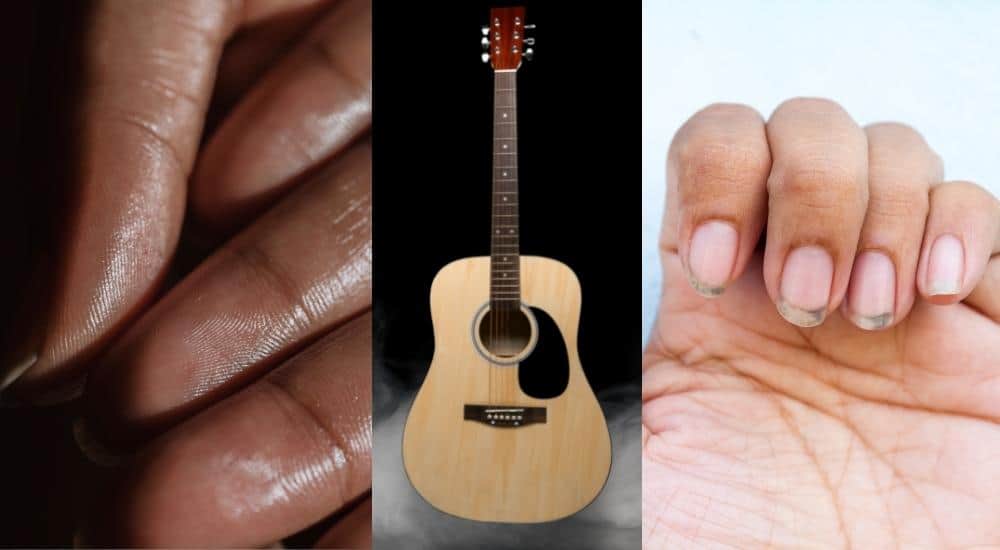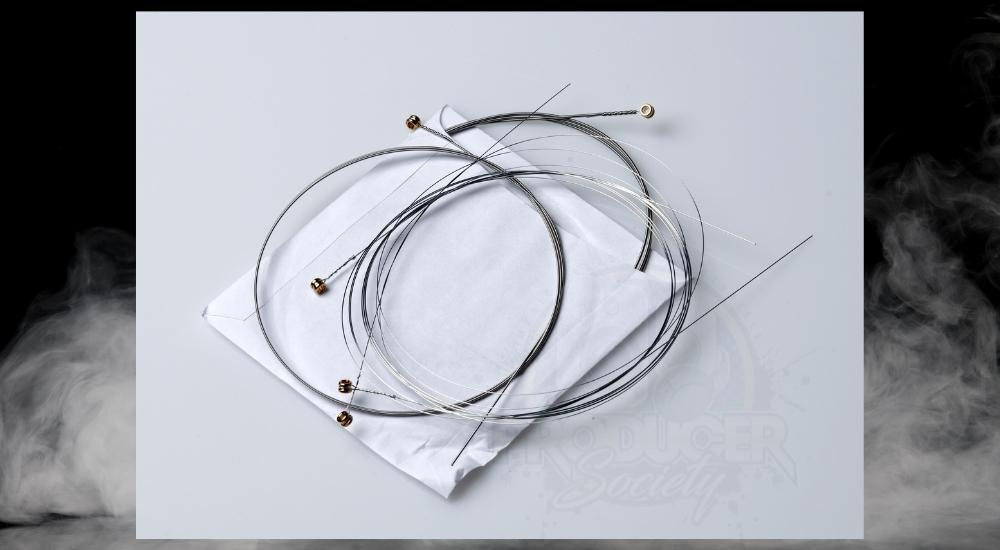Being a guitarist is a great time if you know what you’re doing, but there are some things you’ll have to learn how to do if you plan on playing regularly. One of those things is replacing guitar strings. Either they snap, deaden, or they become unplayable because they sound so bad.
And that brings me to the point of this article, which is why guitar strings tend to sound bad over time, even if we’ve done our best to keep them clean. Simply put, the reason for this is that they’re no longer fresh. They’re old, used, and they’ve gone bad so to speak. But how does this happen and what causes it?
Guitar strings go dead due to a combination of dust, oil, and sweat build-up on the strings. Humidity and temperature changes are massive culprits as well due to corrosion. If you live in a very humid climate, your strings can go bad much quicker too.
There are many reasons why guitar strings wear out quickly and why build-up happens, but you can also prevent these things with regular maintenance, wiping down your guitar after you use it and washing your hands before you play. You can also upgrade to more expensive strings like Elixirs and other polymer-coated brands if you don’t want to change your strings as often. That all said, let’s dive into some of the other factors in better detail.
How and Why Guitar Strings Wear Out?
1) Your Fretboard Is Constantly Dusty or Dirty
![Dirty Fretboard - What Makes Guitar Strings Go Dead [ANSWERED]](https://travelingguitarist.com/wp-content/uploads/2021/12/Dirty-Fretboard-What-Makes-Guitar-Strings-Go-Dead-ANSWERED.jpg)
Keeping dust and dirt away from your guitar is important for many reasons. Mainly to keep the mechanics in working order but also to keep the frets and strings from wearing out too soon.
It’s easy to let your guitar just collect dust if you aren’t motivated to play it, but if you are keeping it clean, you might get a little more use out of the strings.
If you want to spend as little money as possible and you never want to change your strings, always wipe down your fretboard when you change the strings, but also wipe it down before and after you play, or once a week, whatever comes first.
I use a cloth like this even though it might not be the best kind. I think it works amazingly well for the fretboard and for the body.
Try not to use anything on the fretboard or frets that may be too harsh for them. Make sure you get in the edges of the frets with the cleaner and cloth. I use q-tips to clean underneath the bridge and other hard-to-reach places.
2) You Aren’t Properly Controlling the Humidity in Your Home
![A Hygrometer and an Acoustic
Guitar - What Makes Guitar Strings Go Dead [ANSWERED]](https://travelingguitarist.com/wp-content/uploads/2021/12/A-hygrometer-and-an-acoustic-guitar-What-Makes-Guitar-Strings-Go-Dead-ANSWERED.jpg)
Hygrometers are the way we measure the amount of moisture in the air. According to Guitar Fella, if it’s under 40% it’s too dry or low, and if it’s over 60% it is too wet or high humidity.
To find out how humid it is where you keep your guitars, look for this Hygrometer. You’ll be able to tell if you need to calibrate it with a humidifier or dehumidifier.
One humidifier you can purchase is this Levoit Humidifier. It will keep a large room at perfect humidity, all you have to do is turn it on and fill the water tank every few days.
Keeping up with the humidity your guitar receives is a good way to ensure your guitar lasts a long time even though it’ll probably be just fine either way.
In some environments, you could cause the wood to get dry and break, or wet and bend, eventually destroying it. Although, most guitars will be completely fine in a majority of environments. It’s not like they’re that fragile.
We’re mostly talking about how to optimize your guitar’s environment which you may care a lot about, especially if you have vintage instruments.
Another great humidifier that is great for travelling or if you only care to take care of one instrument is a Guitar Humidifier. What’s nice about it is that it’s super specific in the sense that you can focus on just one instrument, rather than a bunch of them, or your entire place.
If you have too much humidity, like if you live by a large body of water, you may want a dehumidifier. You’ll have to establish a routine of dumping the water instead of filling it because you’re doing exactly the opposite of making the room humid.
3) Temperature Changes, Especially Severe Ones
![Tropical Climate and Winter - What Makes Guitar Strings Go Dead [ANSWERED]](https://travelingguitarist.com/wp-content/uploads/2021/12/Tropical-Climate-and-Winter-What-Makes-Guitar-Strings-Go-Dead-ANSWERED.jpg)
Cold and hot temperatures have a lot of impact on strings and wood. Make sure to keep your guitar at the right temperature, around 70 to 75 degrees F or 21 – 24 degrees C.
Anything too hot or cold can cause the wood to warp and strings to break or just detune so much they lose their tone or become weak (more on breaking guitar strings in my guide). However, your strings are more likely just to detune rather than break.
You won’t be running into severe temperature changes like this regularly unless you live in a climate where ups and downs are the norm.
When I stayed in Las Vegas, I noticed how much the weather varied from a day-to-night basis, and in that situation, I think maybe a hygrometer or a guitar humidifier would be a good idea, at least if you wanted to minimize string changes and constantly needing a set-up.
That said, I live in Montreal in an older apartment and I find that even here there can be significant variation in temperature and humidity.
It’s not that uncommon for me to pick up my guitar after the previous night and notice that all of a sudden the guitar doesn’t play quite as good as it did the previous night.
Usually, I’ll have to tighten the truss rod a bit to accommodate for that, and maybe adjust the intonation the tiniest bit.
However, this process takes literally 5 minutes so it’s not something that annoys me too much. If you despise (or are afraid of) setting up your guitar or changing strings, a hygrometer, guitar humidifier, or dehumidifier may be in order.
4) Oil and Sweat from Fingers Can Cause Buildup On The Strings

If you’re a performer, particularly if you’re under bright lights, you’ll probably sweat a lot onto your strings.
If you’re not a performer, you may not have to worry so much about sweat and oil, but the fact of the matter is that whether you’re a performer or not, you’re still going to sweat on your instrument a bit.
String cleaner/conditioner like this may help your situation, or you could wipe down the strings after you play but there’s no real evidence that the conditioner keeps the strings in better shape for a longer period of time.
You may be better off wiping them down and just changing them every few weeks which is what I do.
This wasn’t always the case, however. I used to change my strings far too seldom, like maybe once every three months, despite playing every single day for hours. This is no way to go about guitar playing in my opinion, especially if you’re recording (although not everyone notices or cares).
I find that electric guitars just don’t sound as good when the strings are dead, particularly if you play a lot of lead guitar which tends to be higher up on the fretboard.
If you’re just playing open chords or you’re playing in the first and second position, you won’t notice string deadness as much, but higher up and you can definitely start to hear it, in my opinion.
Even if your fingers don’t necessarily feel oily, they probably are. Touching your face or body can pick up oil and transfer it to your strings.
A lot of guitarists touch their hair and face while they are playing because their hair or sweat sits uncomfortably as they perform. Guitarists also touch their faces a lot when they are frustrated sitting at home trying to nail parts.
To combat this issue, try the obvious, not touching your hair, face, or any other oily surfaces before you start playing. You can also wash your hands before you play and wipe down your strings before and after you play with a lint-free cloth.
This will help extend the life of your strings at least a few weeks longer if you play regularly. Boiling guitar strings actually works too – here’s my guide on it.
Another thing you can do is just keep a towel nearby and you can wipe your face and hands down every once in a while.
This might also save your equipment if you spill water or something which is something that I did to my MXR Clone Looper just a few days ago (which made me incredibly sad by the way). Update: I did end up fixing it though with a bag of rice.
5) Strings That Aren’t Good Can Go Dead Quickly

We all know the adage “you get what you pay for” and with guitar strings that may or may not be true, I can’t really tell you. I’ve never purchased budget guitar strings in my entire life nor have I seen them. I’ve almost always used Ernie Ball, Dean Markley, D’Addario, or Elixir strings, just to name a few.
They come highly recommended because they are tried and true, but most of all they last and don’t need to be changed hardly as often (at least according to common knowledge).
A lot of guitarists theorize that all guitar strings are made at the same factory, it’s just that some have cool packages, labels, and branding while others don’t.
It’s hard to say, but the way I look at it, who cares? It’s like $8 for a set of brand-name guitar strings, so I don’t sweat it when I have to buy a new package. The only ones that cost a lot more money are Elixirs, which, as I’ve stated before in my guide, actually last longer due to their polymer-coating.
6) Heavy Playing or Hours of Playing

Strings are meant to be played, but even if you bought the best strings and made sure to wipe them down consistently, you will still eventually have to change the strings because the luster and brightness are gone or they just don’t sound as good. There are a few other signs they’re starting to decline which I’ve discussed elsewhere on the site.
Either way, you have to break the strings in when you first change them, and then they are good for a while, but they will start to decline in tone and eventually become dull sounding. This can be exacerbated by heavy-handed guitar playing. By that, I mean that if you pick really hard and fret equally as hard, you’ll probably wear them out a bit faster.
That said, the difference between heavy-handed playing and lighter playing won’t be tremendous. Play the guitar in whatever way feels the best to you.
7) Dead Skin Cells On Fingertips
![Skin Cells - What Makes Guitar Strings Go Dead [ANSWERED]](https://travelingguitarist.com/wp-content/uploads/2021/12/Skin-Cells-What-Makes-Guitar-Strings-Go-Dead-ANSWERED.jpg)
Imagine oil, dead skin cells, and sweat combined into pasty gunk and that’s pretty much what happens on the molecular level of your fingertips on the strings.
Over time it builds up and you will see it and can even scratch it off of your strings with your fingernail or a butter knife.
This is a physical warning that will tell you to change your strings before they break. Again, washing your hands and wiping down your strings before and after will also help keep the dead skin cells off and help extend their life.
I find that I know guitar strings need to be changed once I get scrape the gunk off of them with my fingernails. Once you’ve arrived at that point, I know it’s time for them to be changed.
The same thing goes for gunk on the fretboard. If there is significant grime and dirt on the guitar fretboard, the strings are soon on their way out as well.
Other Articles You May Be Interested In
- How Tight Should Guitar Strings Be?
- Can Guitar Strings Rust or Do They Tarnish? [ANSWERED]
- Are Guitar Strings Dangerous?
Important Things to Note About Guitar Strings
1) Don’t Fret The Small Stuff
As a guitar player of almost twenty years, my opinion is that it’s best not to worry about trivialities. Just replace the guitar strings when they start to sound bad or don’t if you don’t want to. Like I said earlier, not everyone notices or even cares if there’s a slight reduction in quality.
I have no doubt that some of the best players on earth have tracked and recorded albums with old, crappy strings or with less than adequate conditions. That really gives you an idea of how important such things really are. Music is music. Try not to impose so many rules on yourself.
Gear Mentioned
1) Microfibre Cloth
2) Hygrometer
3) Guitar Humidifier
4) Dehumidifier
5) String Cleaner/Conditioner
6) MXR Clone Looper
7) Elixir Strings 9-42

 Written By :
Written By :